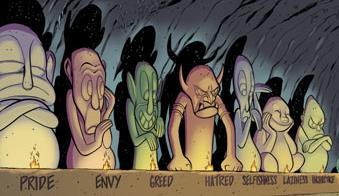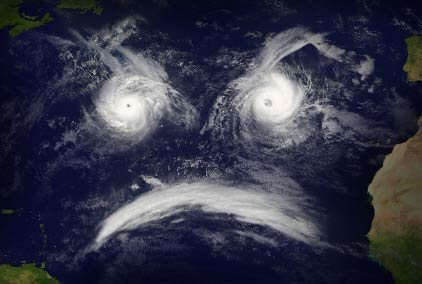Primary tabs
Best of Spirits
Readiness is All
We cannot possibly be perfectly prepared for every possible contingency. But we can be ready.
Scene #1. You're one of several young urbanites at a campout with a few friends, after a long day swimming, hiking, and now after a fine meal, joking, laughing. You're mellow; relaxed; right? feel it? (No, Reader, now you're not relaxed because you're looking at that big type in the next sentence.) SUDDENLY A HUGE SNARLING BEAR COMES CHARGING OUT OF THE WOODS AND STRAIGHT AT YOU!
Scene #2. You're out hunting with a few friends. (Just go with me on this, PETAfans.) You're armed with a high-power rifle. (Knowledgable gun person insert brand and calibre.) You're hunting a bear that's been known to attack and kill people. You and your friends are highly trained hunters and you are on his trail. (Good old cut-and-paste:) SUDDENLY A HUGE SNARLING BEAR COMES CHARGING OUT OF THE WOODS AND STRAIGHT AT YOU!
Now, if you're an average person in approximately the first scenario, your first instinctive response will probably not be to charge forward, screaming in rage, straight at the bear and lunge for his eyes or jugglar with whatever was in your hand. Ew. Sorry. I just thought of that as I was writing. No, you're probably going to do something like run away screaming in high-pitched terror, faint, freeze, or muss your underoos. You were, in a word, unprepared. Or in another word or three, unready, inattentive, inalert. Wait, is that a word?
If you're an exceptional person in the second scenario, you kill the bear. Readiness is all.
You're hanging out with folks and someone you thought you liked but weren't sure about repeats an ugly rumor about you that you've resented for a long time. You're enjoying driving your Kia on a winding country road and suddenly in your rear-view mirror, there's a six-wheel extended-bed, extended-cab, jacked-up Ford pick-up right on your tail. (Oh, sure, why not:) Driven by with those four hunters who just killed the bear. They're really the nicest men you'd ever want to meet, and no they haven't been drinking, not one beer, but all you see is their truck, attire, and all those guns. Or, you're absorbed in reading an article that's witty, well-written, informative and casual, and someone comes and interrupts you with an urgent phone call from the IRS.
Readiness is all.
Being perfect in your personal realm as God is in all of creation, means readiness. Are you superman enough to charge back at the bear, armed with two pieces of plastic cutlery? Can you be the soul of graciousness when surprised by a harsh spotlight being placed upon you? Can you have completely confident calm control in the face of potentially threatening situations? Are you able to easily migrate your whole consciousness from that absorbing article to deal with your remarkably upset spouse?
We cannot possibly be perfectly prepared for every possible contingency. Sometimes you're hunting the bear. Sometimes the bear hunts you. Sometimes the bear kills you in your sleeping bag and there's not a whole lot you can do about that, so we're talking about the other times.
We can develop a spirit of readiness.
To be ready is to be unsurprised.
You may not know when or even if the killer bear is going to come charging at you, but you know it's out there.
Graciousness is not the natural hallmark of Ego. Tame the animal mind's vengeful impulse, translate its emotional surge into the desire, not to return an eye for an eye, nor even merely to turn the other cheek, but to respond with a practiced dedication to returning good for evil. In love of your fellow child of God, Supremely desire to de-power the unpleasant encounter.by making everyone both comforted and uplifted.
Regardless of what you face from the material world's agencies, if you remain centered in complete honesty with yourself and with the judges of the world, even in the face of the gravest injustice, you can be confident that your soul is innocent.
Best keep those books and records up-to-date, keep your powder dry, and know where the exit doors are. Get in some target practice if you can, just in case. Practice turning your whole intellectual consciousness and full emotional attention away from that almost-finished article to embrace that screaming spouse the way you would in love of a beloved small child weeping over an owwie.
We cannot be perfectly prepared for each and every thing. In spirit, however, we can be ready. Practice being fully prepared by keeping the mind clean, maintaining focus on the lessons learned from inspiration, and keep acquiring the skills of life through perspiration.
One time driving along a narrow gravel road in the mountains above Pecos, New Mexico, we saw a bear cub, its muzzle nuzzling in a hole, right there in the upsloping side of the road-cut, as we passed by a few feet away. We wanted to stay longer and watch the cub. But we drove on. No need to worry Momma Grizzly.
Charge Forward — companion Best of Spirits Mindful Webwork
"It was just me between my family and the bear. ... The father said he was able to successfully fend off the aggressive beast because he and his family were mentally prepared for such an encounter in the wild and did not panic."
I recently encountered another episode which demonstrated in a small way the affliction of overmuch self-consciousness. A young friend, in an effusive text reply, clearly mis-read what I had written. I corrected the error. My friend then apologized profusely. No problem, I said, but just take things slow, read twice, I recommended. The reply to something I wrote the next day was a noticably more reserved "OK," which actually didn't even make sense in the context. Knowing this individual's character, I suspect that the reticence of the second incident was in response to the earlier correction, a self-conscious over-reaction to having been found before to be wrong.
Mere correction should be cause for thankfulness, really, but all too frequently the one being corrected feels chided, put down for being in error, and this in turn generates defensiveness, and defensiveness severely complicates learning.
We are all imperfect, while being commanded to be perfect. In this world of "trial and error," wisdom often can only be achieved through learning from error. When one is instructed on what is right, there is intrinsically, inevitably, a certain emphasis upon the fact of having been in error. Correction should be celebrated, as one more step of growth, but the Ego gets in the way. The Ego doesn't want to be wrong, or more correctly, since Ego alone does not have a value system to discern right and wrong, Ego does not want to be found out as being wrong. Being wrong, the Ego imagines, means shame, and invokes guilt, as if one should already have mastered something the first time out, as if mere error were conscious sin.
Pride may be the most insidious of the "deadly sins." Most folks can admit that wrath or sloth are unwelcome traits, but Pride defends itself proudly. The reasons for error are essentially irrelevant to correction, but when pride stands in the way of correction, the focus is not on the goodness of correction but on badness of the error, and the Ego, feeling belittled, becomes engaged in defense. "I was only…" "I just meant…" "All I was doing was…" This thoughtless defensive posture not only de-emphasizes the correction, but reinforces the error in the gestalt of the subconscious. Even though the correction may be intellectually acknowledged, rather than the grateful "Aha!" of honest truth-recognition, the emotional memory is more of a disingenuous "oh, yeah?" of self-justification. And all such defensiveness stems from Pride.
Pride thwarts learning, and thus hinders growth. Growth is our goal, with perfection our destiny. Thus, defensive and misplaced Pride stands athwart our path, and threatens us with the opposite of eternal life.

Determinism vs Free Will
When I began pondering the question of determinism and free will, I found myself, philosophically and theologically, going back and forth.
Many years ago, we read this, upon which we've often reflected:
In the question of nature v nurture:
Parents of one child believe it's all environment.
Parents of more than one child understand, it's all genetics.
I'm sure you get it, but to belabor the point anyway because I suffer from prolixism: the former take all credit or blame, depending on the results, the latter recognize that given the same approximate upbringing, one can get radically different results.
Certainly has been something we think about a lot as parents of fraternal twins! (If other parents have yet to fully appreciate this, so far having nothing but wonderful darling little ones, wait until you've shepherded all the offspring to adulthood. But then, it may be God's will all yours will remain trouble-free and you can take all the credit. While thanking God of course. Lest my humor be misunderstood due to deadpan delivery, please note: :-^ tongue in cheek.)
There are determinists among scientists and determinists among religionists. There is room for free will in quantum physics, though, and some religionists hold that we are the free-will children of the God of free will, even that free will may be the primary way in which we are created "in His image."
When I began pondering the question of determinism and free will, I found myself, philosophically and theologically, going back and forth.
On the one hand, the omnipotence and omniscience of the Almighty, that God knows the end from the beginning, that God cannot be surprised, augers for the theologies which favor election (and rejection). On the other hand, if there is no free will, how are we aught but automatons? That the Creator is in absolute control of the entire Creation can't be questioned, yet if the Creator chose to grant to the creature true spiritual liberty, full and free choice regarding eternal destiny, that also can't be questioned. (The limited time-frame of the earth-life for the full presentation of the eternal choice has incited ameliorating possibilities, reincarnation in the East, purgatory in the West, but merely extending the question to one type of after-life or another does not affect the basic dilemma under consideration.)
We are raised — in the modern West at least — with the rejection of old conceptions such as the divine right of kings and with the acceptance of the right of personal liberty. We recognize that one may be mentally incapacitated, truly incapable of recognizing right and wrong, but we assume, socially and in our courts, that, otherwise, people are freely choosing. (Otherwise, we would be like those tyrannies where both the thief and the political dissident are considered "insane" and are alike sentenced to "re-education.") However, in religion, such libertarianism and individualism might seem truly the endowment of our Creator as the revolutionary wrote, or could be construed to be more like the diabolical rebel angel who contested the God-centered universe. A philosophically distressing dilemma to ponder.
Perhaps the best clarity I've had on the matter is this simple comparison with the mortal parent: A mere human parent may know the child well enough to predict what choice the child will make. This in no way abrogates the free will of the child, but it does acknowledge that we choose according to our nature and training. If we as material parents can be so foreknowing, we can extrapolate that our divine Parent can, indeed, grant us true freedom of choice, yet foreknow how we will choose. In the end, I can't do better than that, except to confess that the divine power and prerogative makes such conundrums practically beyond our comprehension.
Therefore, I have long since concluded — not too surprisingly considering my own sometime artistic bent — that I am…
…a Calvin & Hobbesian.

A Mindful Original Remix

John Calvin and Thomas Hobbes by Spacecoyote
after Watterson, of course
Linked from Robin Parrish at Forever Geek
Linked from Alan Gardner at Daily Cartoonist
Discerning Compound Problems
Problems are sometimes simple. More often problems are compound and complex, and complicated.
Part 1 - Simple, compound, complex, and masking
Simple example
Trying to reconcile a bank statement. (If you don't know how to reconcile a bank statement, learn. Meanwhile, just go with it. It's about addition.) There's an error of $3.95. Go back through the records, and, aha! there's a check for $3.95 that wasn't entered, or hadn't been marked as returned. Voila! Simple problem, relatively easily resolved.
Compound example
Two checks were not recorded, one for $5.00 and another for $2.00. The bank reconciliation shows a $7.00 error. Searching for a $7.00 check is fruitless. Looking for multiple checks that add up to $7.00 works. Once one of the two errors is discovered, the compound problem becomes simple.
Complex example with partial masking
A check for $5.00 was not recorded. Another check for $2.00 was not marked as returned. The bank reconciliation shows a $3.00 error, but the error is really $7.00 in two different directions. Searching for a $3.00 check is fruitless. Looking for multiple checks that add up to $3.00 is fruitless. Finding the $2.00 check and marking it as returned seemingly increases the reconciliation imbalance from $3.00 to $5.00, but really the problem has been lowered from $7.00.
Complex example with total masking
A check for $5.00 was not recorded. Two other checks for $2.50 each were not marked as returned. The bank reconciliation does not reveal any error because the three errors combine to look like nothing. How would you even know there was a problem? You might not, until the next month when the unentered check clears.
Part 1 review
Errors can compound. The more errors compound, the harder to resolve each of them. Symptoms may partially mask each other, making it harder to know what the errors are. Symptoms may combine to utterly mask that there even is a problem. Until things get worse.
Part 2 - Compound, complex, and complicated considerations
Simple considerations
If the error is single, only two possiblities need be considered. Either the check was not entered, or the check was not marked as returned.
Compound considerations
With two errors, there are more possibilities to consider. Both might be un-entered. Both might be not marked returned. One might be not returned, one might be un-entered. The problems may mask each other, partially or completely.
Complex considerations with masking
A check for $5.00 and another for $3.00 were not recorded. A third check for $5.00 was not marked as entered. The reconciliation shows a $3.00 error. Recording the $3.00 check appears to make the account reconciled, but there are really two $5.00 errors remaining totally masking one another.
False resolutions
The foregoing examples suppose two possible ways to err, not entering a check, or not marking a check off as returned. In reality, there are so many ways to err! The check was written for $3.95 but was entered as $3.85. Searching the records and the bank statement diligently will never disclose why the reconciliation is off by a dime. Only going outside the registry to the original document will disclose the real error.
Understanding complexity

Attempting to reconcile an account statement discloses $3.00 in error. At the outset, there is no clue how many errors exist, of what amounts or in which directions. Consideration is given first to the simple error, then to the complex possibilities, then to compound and masking possibiliites.
First, there must be awareness of the problem even existing. Then, consideration must be given to all the possibilities of compound and complex. Masking may make it seem that resolving one error was sufficient, but others lurk undetected.
All these account-reconciliation examples result in one symptom, addition error. Most real-world problems have multiple causes and multiple symptoms.
Second: Perceptual Pareidolia — In order to imagine an alternative to your perception, you must admit to the possibility of perceptual confusion.
Ill winds of April
Along with the physical weather damage there's been waves of what I've come to call "April madness," a seeming spike in random beat-downs, suicides, family murders, etc. Just my impression; I've not compiled statistics.
"The wind is in from Africa
Last night I couldn't sleep."
 That line of Joni Mitchell's was what first got me thinking about ill winds, like those known to blow into Europe off of Africa, among others. Some say it's the ions. There's also the relatively recent awareness of weather- or seasonal-affective disorder.
That line of Joni Mitchell's was what first got me thinking about ill winds, like those known to blow into Europe off of Africa, among others. Some say it's the ions. There's also the relatively recent awareness of weather- or seasonal-affective disorder.
I think there's maybe more than just those things, although I couldn't say what. Ions might be enough. Whatever. That storm that blew through earlier this month, with tornadoes killing dozens? I watched the weather radar the very hour the line of storms first formed, just west of us, and it was scary how fast it grew to monstrous force and extent. Tornadoes struck within a few miles North and South of us. I can report that before, during, and for a while after that, emotions raged around our house. Afterward, in recovery, we realized we felt like we'd been drugged, poisoned. Along with the physical weather damage there's been waves of what I've come to call "April madness," a seeming spike in random beat-downs, suicides, family murders, etc. Just my impression, over a couple of years; I've not compiled statistics.
4/9: Santa Monica Synagogue Explosion Suspect Sought by Police
4/9: Gunman kills six and wounds 16 at Dutch shopping centre
4/10: Two killed and eight wounded as gunman opens fire at girl's 18th birthday party in Philadelphia
4/18: 18-year-old charged in McDonald's beating
4/22: Brutal Attack On Food Deliveryman Caught On Tape In Morningside Heights
4/26: Cop used excessive force in IHOP melee
(A small random sampling of news articles, which doesn't even include the violence going on throughout the Middle East.)
If weather — especially dramatic changes — seriously affect moods, for whatever reasons, well, April is major weather change month. Columbine and Waco and OKC were all on 4/20, Hitler's Birthday. (Thank goodness this year's 4/20 bomb in Colorado, 2 miles from Columbine, did not go off!) Of course, McVeigh said the OKC date was intentionally chosen because of the anniversary of Waco, so not every April insanity should be attributed directly to the ill winds, but I'm suggesting that these are realities to be careful about: Be aware you and yours may be subject to externally-induced moods. What can we do? Not much about the weather itself. (Heh — "Everybody talks about the weather, but…") First, try to remember your (or someone else's) foul mood could be an uncontrollable reaction related to weather. The mood alteration begins well before the actual storm breaks, just as the barometer changes. Watch the barometer, get plenty of rest, take your B vitamins, watch Marx Bros movies, and wait out the storms.
Our Naturopath has a homeopathic remedy combination for "Anxiety" which I believe helped us a lot. (If you don't "believe" in homeopathy, tune out now, I'm done.) We've always been "classical" homeopathic users, which system doesn't use these combination remedies, so I don't know if one or several or all of these remedies were effective, but if only the placebo effect, thank Heaven for it! Not gonna post the doc or the remedies involved, this is not the place, but if you find yourself anxious, and can find a genuine homeopath advisor, maybe it can be of benefit to you. (Noting that Sturgeon's Law applies redoubled: 99% of "homeopaths" are worse than useless new-agey many-discipline kooks; there was a really great homeopathic MD we used to have in Chicago, so they do exist).
